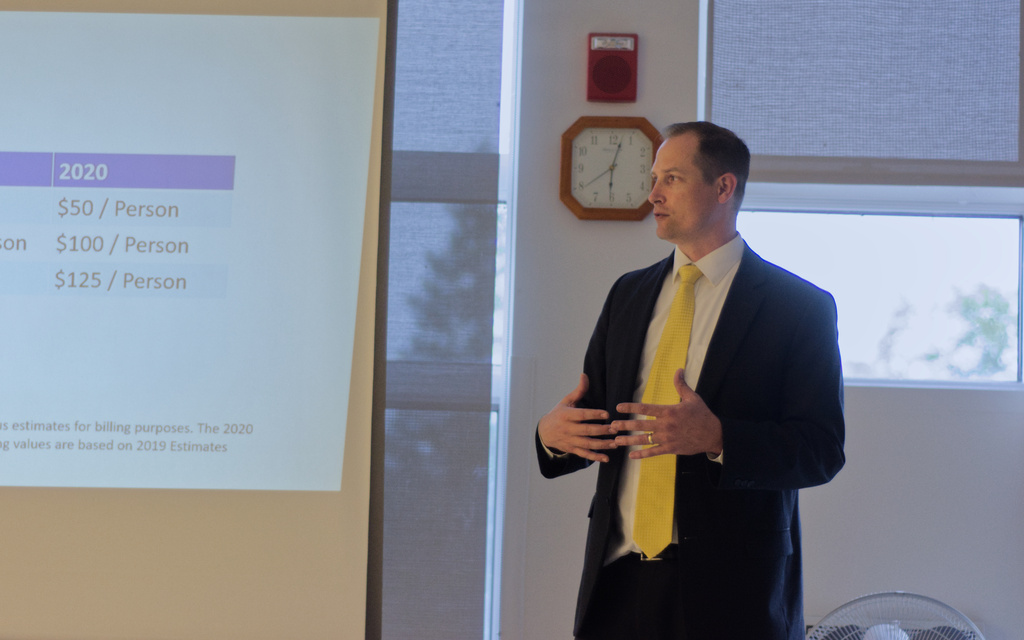
CARIBOU, Maine — Caribou City Council held an open meeting with neighboring communities serviced by their fire and ambulance department Sept. 15 concerning how the COVID-19 pandemic could affect service rates.
The city’s EMS rates have been a topic of controversy since the rate to outside towns went from $11.50 per capita to $100 per capita, and neighboring municipalities were initially given roughly two weeks notice before their contracts expired.
Caribou Mayor Mark Goughan acknowledged that the city did not initially give towns enough time to respond to the sudden increase, and said this meeting was an effort to get information out to the surrounding communities sooner.
By starting the discussion in September, he said, communities will have a three month lead time before contracts go out and a larger window of time to make a decision.
Caribou City Manager Dennis Marker shared data with the attendants concerning the audited 2019 financial statements, what the rates would look like for 2020 without COVID, and how the pandemic has impacted the budget.
According to the 2019 audited financials, the total fire and ambulance department budgets combined, which includes operational, capital, and debt related expenses, was $2,537,098. The per capita cost for each Caribou resident, based on the 2019 census indicating a total population of 7,593, was $121 for both the fire and ambulance service.
With Limestone signing on earlier this year to receive Caribou’s ambulance service at the $100 per capita rate, the estimated 2020 per capita rate for both fire and ambulance services for each Caribou taxpayer was moved down to $100. Based on Limestone’s population of over 2,000 people, the town is paying approximately $203,000 annually for Caribou’s EMS contract.
Factoring in the pandemic, however, Marker said that the resulting budget would result in nearly $300,000 lost on the revenue side.
“The expenses stayed fairly close to the same, but our number of transfers and calls actually reduced, and because we’re seeing fewer calls, we’re also seeing less revenue,” Marker asid.
The estimate of $136 per capita to Caribou residents is based on the contracts of $125 per capita for both fire and ambulance services to surrounding communities staying the same.
Woodland Selectman Will Barnum acknowledged that while nothing can be done about COVID, he asked that the city take into consideration that the surrounding communities are also dealing with their own burdens because of the virus.
Additionally, Barnum criticized the decision to charge surrounding communities the same rate when the service received in Caribou is going to be much faster than to outside communities. He said the city should also take into consideration the number of calls that come from each community, so a town with roughly four calls per year isn’t paying the same as a community with a significantly higher number of annual calls.
Perham selectman David Heald said the town was dissatisfied with the rate increase and the way it was handled.
“Now our coverage from Caribou has been discontinued and we’ve been gracious enough that Presque Isle has made a couple trips,” said Heald. “We’ve talked to them, and their concern is the coverage time, which is maybe a 10 or 15 minute difference. We’re still searching.”
Heald also took issue with the $11.50 to $100 per capita increase, adding that Perham has reached out to ambulance services throughout the region and $16.50 is the highest rate they’ve seen.
Caribou City Councilor Doug Morrell said he understands Heald’s point, but that he is looking out for the Caribou taxpayers.
“I’m here to defend the Caribou taxpayer who, through no fault of any other community and through bad management in the past, has subsidized health care services to other communities for years,” he said.
He added that the situation would be different if the ambulance became a regional service and other communities shared in responsibility for the associated risks.
Barnum took issue with the idea that Caribou taxpayers have been subsidizing other towns, and said that based on the 2018 numbers, with Woodland paying $11.50 per capita, Caribou actually netted a profit of $40,000.
“I would be very guarded to say the city of Caribou is subsidizing other communities,” Barnum said. “I think you’ll find most of the communities were actually a benefit to Caribou.”
He also took issue with Morrell referring to the ambulance service as a business.
“A business makes a profit,” said Barnum. “A service breaks even. You’re looking at it from the wrong perspective.”
“That’s the way it needs to be looked at,” Morrell said. “That’s the problem with the systems across the country. Unfortunately it’s going to cost us all.”
Perham Selectman John Rasmussen said there are a number of different tax revenue sources in Caribou, not just residential but commercial, agricultural, and industrial, all of which generate revenue.
Goughan commented that he believes the majority of the council wants to treat the ambulance service like a business so the profits can be shared with everyone, and that in the future they would like to expand to a regional service where the surrounding communities are all involved.
Councilor Joan Theriault encouraged people in attendance to look at the EMS rates from the perspective of an insurance policy — something that everyone needs to purchase, and that they hope they never have to use.
“I was sick to my stomach when I saw what had to happen, but we can’t just let Caribou taxpayers pay for the services,” she said. “It should have been over $11.50 and I do believe the other towns will eventually have to raise their per capita prices as well, but we want to do it for you, I do, but I can’t justify doing it on the backs of our taxpayers. It’s just a sign of the times. I’m sorry, I really am, but it is what it is.”







